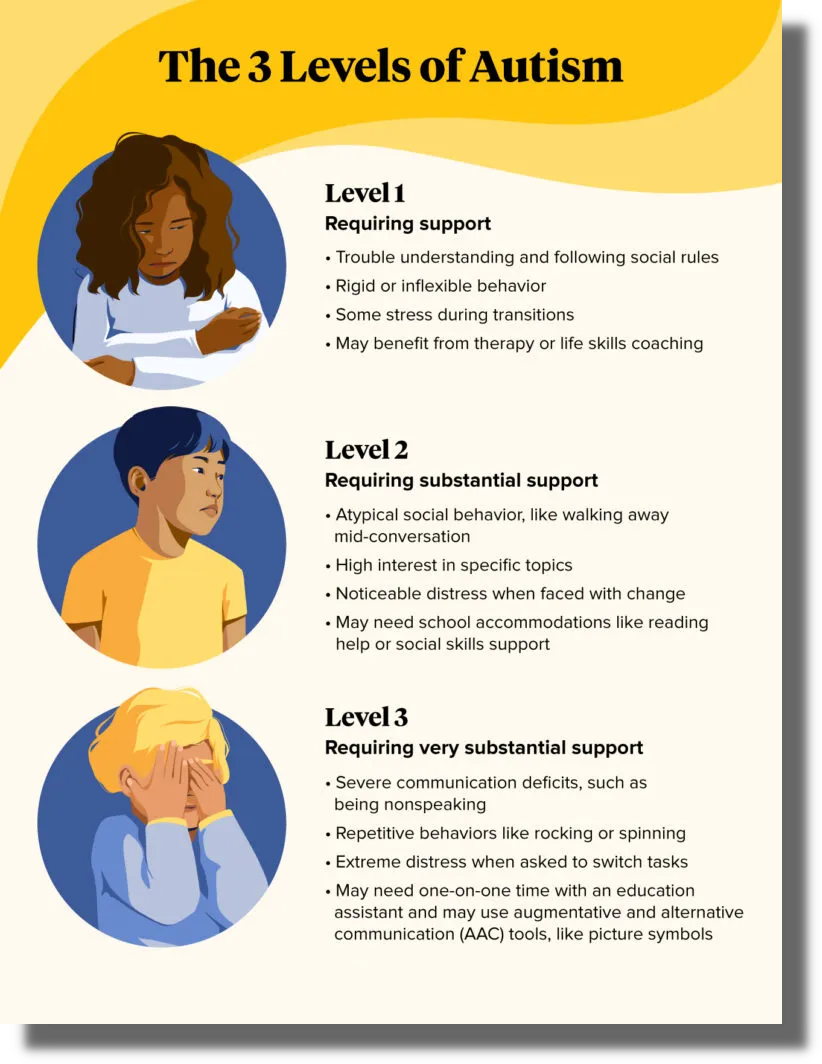Does Autism Behavioral Therapy work long term? Here’s what research shows
Does Autism Behavioral Therapy work long term? Here’s what research shows
Blog Article
Comprehending the Effect of Behavioral Autism on Every Day Life and Social Interactions
You could not recognize how deeply behavioral autism influences daily life and social interactions. People on the spectrum commonly navigate a world full of interaction obstacles and sensory overload. These obstacles can lead to stress and isolation, influencing their partnerships and general well-being. Understanding these nuances is crucial for promoting encouraging environments. What methods can we carry out to create even more meaningful links and inclusive rooms? The responses might stun you.
Defining Behavior Autism and Its Attributes
Behavioral autism, frequently described as autism spectrum problem (ASD), includes a series of problems defined by challenges in social communication, communication, and recurring behaviors. You could notice that individuals with ASD usually have a hard time to translate social signs, which can cause misunderstandings in discussions. They may discover it hard to establish eye contact or engage in little talk, making social scenarios really feel frustrating.
Interaction troubles can manifest in various means, from postponed speech advancement to a choice for making use of fewer words. Recurring habits, such as hand-flapping or shaking, can serve as coping devices to manage stress and anxiety or sensory overload. These features can profoundly influence daily life, making it vital for you to comprehend and sustain those with ASD. By identifying these qualities, you can foster an atmosphere that advertises acceptance and motivates reliable communication, assisting people with autism prosper in their daily communications.
The Range of Autism: Recognizing Irregularity in Habits
Autism range condition (ASD) isn't a one-size-fits-all medical diagnosis; it varies extensively amongst individuals. You might run into people who are highly verbal and involve easily in conversations, while others may like singular activities or connect non-verbally.
Additionally, the means people with ASD reply to sensory input can differ considerably; some may be overwhelmed by loud sounds or brilliant lights, whereas others flourish in stimulating settings. The range likewise consists of distinctions in social interactions; some people might have a hard time to analyze social cues, while others navigate social setups with relative convenience. Understanding this irregularity is essential, as it assists you value each individual's unique experience and dressmaker assistance to their details demands, cultivating a more comprehensive environment for everybody.
Communication Challenges Encountered by People With Autism
When you interact with people on the autism range, you might observe their one-of-a-kind communication difficulties. They frequently encounter difficulties with both verbal and nonverbal signs, which can impact their social interactions. Comprehending these barriers is important for cultivating far better connections and support.

Verbal Communication Difficulties
Several individuals on the autism range experience verbal communication problems that can considerably impact their everyday communications. Your rate, tone, or volume could not line up with social assumptions, causing others to misinterpret your purposes. Recognizing these obstacles can aid you and your support network develop techniques to improve interaction and foster far better connections with others in your day-to-day life.
Nonverbal Communication Barriers
Verbal interaction isn't the only obstacle people on the autism range face; nonverbal interaction obstacles can be just as considerable. You may find it tough to analyze body movement, faces, and eye contact, which are essential for effective interaction. These difficulties can bring about misconceptions or false impressions of social hints, making communications feel complex or frustrating. You may have a hard time to share your own feelings with nonverbal means, leaving others not sure of your intentions or sensations. This detach can produce sensations of seclusion and aggravation. Recognizing these barriers is important for fostering understanding and compassion in your communications. By dealing with nonverbal interaction, you can locate techniques to boost your social experiences and enhance your total lifestyle.
Social Communication Effects
Social communications can frequently feel frustrating as a result of the unique communication challenges dealt with by people with autism. You might struggle with translating social hints, making it tough to comprehend mockery or body language. This can lead to misconceptions or awkward moments in discussions. In addition, launching and maintaining discussions may really feel difficult, creating anxiety in social scenarios. You might favor organized atmospheres, making spontaneous communications uncomfortable. It's likewise typical to experience problem in taking part in little talk, which can prevent forming new relationships. Acknowledging these difficulties can aid you locate approaches to boost interaction, such as exercising social abilities in risk-free setups or making use of visual help - Autism Spectrum Therapies. Comprehending your demands allows you to browse social communications with higher confidence and convenience.
Social Interaction and Partnership Building in Autism
While building partnerships can be challenging for individuals with autism, comprehending their one-of-a-kind perspectives and communication styles can foster purposeful connections. You could discover that many individuals on the spectrum favor direct communication and may battle with social hints or small talk. By being simple in your interactions, you can assist produce an environment Website where they feel comfortable.
Involving in shared rate of interests can also offer as a bridge to deeper links. Whether it's a hobby, a favored show, or a common passion, these usual strings can open doors to relationship.
Daily Life Regimen: Browsing Obstacles and Methods
Navigating daily life regimens can be especially testing for individuals with autism, especially when unanticipated modifications happen. You could locate comfort in having a structured routine, as it assists you expect what's next. When interruptions take place, it's regular to feel distressed or overloaded. To navigate these difficulties, consider executing aesthetic routines or checklists. These devices can provide clarity and peace of mind.
Establishing a regimen that includes sensory breaks can additionally be beneficial. You can intend brief breaks throughout your day to charge. It's vital to connect with those around you, letting them know your preferences and demands. This aids produce an understanding atmosphere.
Last but not least, technique mindfulness techniques to take care of anxiety and stress and anxiety. Basic breathing exercises or basing strategies can make next page a substantial distinction. By including these methods, you can boost your day-to-day routine and minimize interruptions, making life really feel much more manageable.
Staminas and Capacities of Individuals on the Autism Spectrum
Comprehending day-to-day life routines is just one facet of the autism experience. Many individuals on the autism range have remarkable staminas and capacities that set them apart. You might locate that your attention to detail is phenomenal, enabling you to master jobs that require precision and emphasis. Your capability to think outside package can result in cutting-edge services in numerous scenarios.
Additionally, your memory abilities frequently radiate, specifically in areas of rate of interest. Autism Therapist. This flair for preserving information can make you a useful source in areas like innovation, art, or scientific research. You may also display strong visual reasoning, allowing you to imagine intricate principles and solve issues creatively
Additionally, your unique viewpoint on the world can cultivate empathy and understanding in others, look at here now improving social interactions. Embracing these strengths not just improves your self-confidence yet likewise assists others value the diverse abilities you bring to the table.
Developing Inclusive Atmospheres for People With Autism
Producing comprehensive atmospheres for people with autism starts with creating sensory-friendly spaces that provide to their unique requirements. You can additionally cultivate possibilities for social interaction, helping to construct connections and relationships. By making these adjustments, you'll contribute to a much more inviting environment for everybody.
Creating Sensory-Friendly Spaces
While making sensory-friendly rooms, it's crucial to show on the distinct demands of people with autism. Integrate quiet zones where individuals can pull away and recharge when overwhelmed. Consist of visual routines or clear signs to aid individuals browse the area confidently.
Promoting Social Interaction Opportunities
Creating sensory-friendly spaces not just addresses individual comfort yet also establishes the phase for significant social interactions amongst people with autism. Encourage peer mentoring, pairing individuals with autism with supportive peers who can lead them with social scenarios. By executing these strategies, you can boost social chances, helping people with autism construct friendships and enhance their social abilities in a secure, welcoming atmosphere.

Frequently Asked Concerns
Exactly How Can Friends Support Somebody With Behavioral Autism?
You can sustain a pal with behavior autism by holding your horses, paying attention proactively, and respecting their limits. Participate in activities they take pleasure in, interact freely, and create a comfortable atmosphere where they feel valued and understood.
What Resources Are Offered for Moms And Dads of Children With Autism?
You can check out different sources for moms and dads of children with autism, including support system, instructional sites, and local area solutions. Attaching with various other moms and dads can additionally provide beneficial insights and shared experiences to help navigate challenges.
Can Behavioral Autism Change With Time?

Yes, behavioral autism can transform gradually. You may observe changes in communication, social abilities, and actions as your child grows. Early treatment and assistance typically play vital functions in these developing modifications.
Just How Do Sensory Sensitivities Impact Life?
Sensory level of sensitivities can make day-to-day experiences overwhelming. You could deal with loud noises or intense lights, bring about stress or evasion. Locating atmospheres that suit your demands can substantially boost your comfort and overall life.
What Prevail Misconceptions Concerning Behavioral Autism?
You might think behavior autism just influences interaction abilities, yet it's more facility. Several presume individuals do not have compassion or intelligence, which isn't real. Comprehending these misunderstandings helps foster acceptance and support for those on the spectrum.
Behavior autism, typically referred to as autism range problem (ASD), includes an array of conditions identified by difficulties in social interaction, communication, and recurring habits.Social communications can frequently really feel frustrating due to the one-of-a-kind interaction obstacles dealt with by individuals with autism.Designing sensory-friendly spaces not just addresses individual comfort yet likewise sets the phase for significant social communications amongst individuals with autism. Encourage peer mentoring, combining individuals with autism with encouraging peers who can direct them through social situations. By implementing these strategies, you can improve social possibilities, assisting individuals with autism construct relationships and enhance their social skills in a risk-free, inviting atmosphere.
Report this page